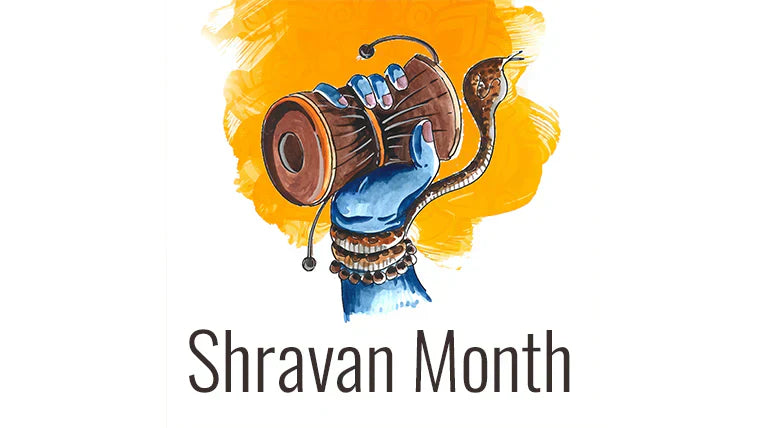The monsoon season brings more than just cooling rains. It also brings Shravan, a holy month in the Hindu calendar that usually falls in July or August. This time is dedicated to Lord Shiva and is filled with traditions and religious practices.
This guide is for everyone, whether you've been celebrating Shravan for years or are just curious to learn more. We'll cover the importance of Shravan Month, the rituals observed, fasting practices, and some of the vibrant festivals that take place. Join us as we explore the faith and traditions of Shravan Month and discover its significance.
Shravan Month (Sawan Maas) Start and End Date for 2025
For Southern and Western states of India, including Goa, Maharashtra, Andhra Pradesh, Gujarat, Tamil Nadu, and Karnataka, Shravan will start on Friday, July 25, 2025 and end on Saturday, August 23, 2025.
For Northern states of India, such as Uttar Pradesh, Rajasthan, Madhya Pradesh, Himachal Pradesh, Punjab, and Bihar, Shravan will begin on Friday, July 11, 2025, and end on Saturday, August 09, 2025.
What is Shravan Month (Sawan Maas)?
Shravan is considered one of the most sacred months in the Hindu calendar, marking the fifth month of the lunar year. Named after the Shravan Nakshatra, which is seen on full-moon days, this month is dedicated to Lord Shiva. Devotees offer leaves, flowers, fruits, and water to the Shiva Linga during this time.
This month is rich in festivals and religious events, making it an ideal time for new beginnings. Mondays in Shravan, known as Shravan Somvar, are especially significant. Devotees visit temples, where the Shiva Linga is bathed continuously with holy water and milk, symbolising purification and devotion.
Historical Importance and Cultural Significance of Shravan
According to legend, Lord Shiva consumed poison during the Samudra Manthan to obtain Amrit (nectar) and save the world. Goddess Parvati intervened by holding his neck, preventing the poison from harming him further, but this caused Lord Shiva additional pain and injuries.
As part of the Sawan tradition, devotees of Lord Shiva fetch holy water from the river Ganga to heal his wounds. Fasts observed on Mondays during Shravan, known as Shravan Shomvar Vrats, are held to honour Lord Shiva and to pray for prosperity, success, and marriage. Since this month is entirely devoted to Lord Shiva, it is considered his favourite month.
Shravan Month Puja Vidhi: Spiritual Observances and Practices
1. Rudra Abhishek
Rudra Abhishek holds significance as a sacred Hindu ceremony dedicated to honouring Lord Shiva. During this ritual, devotees bathe the Shiva lingam with offerings like water, milk, yoghurt, honey, and ghee. The chanting of mantras accompanies the ceremony, seeking blessings from Lord Shiva, while devotees offer fruits, flowers, and belpatra leaves as symbols of devotion.
The atmosphere is purified with burning dhoop sticks and incense while lighting a pure ghee diya symbolises the presence of divine light and wisdom.
HEM Essentials for all your preparations for the Shravan celebrations:
|
HEM Dhoop Sticks: Fill your space with calming fragrances. Shop Now |
 |
|
HEM Dhoop Cones: Experience aromatic smoke in a mesmerising waterfall effect. Shop Now |
 |
|
HEM Incense Sticks or Agarbatti: Choose from a variety of scents to suit your mood. Shop Now |
 |
|
HEM Pure Ghee Diya: Our Aradhana Pure Ghee Diya is perfect for prayer, offering a convenient alternative to handmade ghee diyas, making your puja process hassle-free. Shop Now |
 |
|
HEM Pooja Essential Combo Pack: Hem Special Pooja Essential Combo Pack includes incense sticks, ghee lamp and other puja essentials for a complete puja experience. The incense sticks come in a variety of fragrances like gulab, mogra and chandan. Shop Now |
 |
The ritual symbolises devotion, purification, and seeking divine blessings, usually performed in temples by priests or at home with guidance from religious texts. Each offering has a symbolic meaning, representing different aspects of reverence toward Lord Shiva and fostering spiritual growth in the worshipper's life.
2. Shravan Fasting
During Shravan Maas, followers usually observe four types of fasts, including Sawan Somwar Vrat, Solah Somwar Vrat, Pradosh Vrat, and Mangala Gauri Vrat.
- Sawan Somwar Vrat: This fast occurs every Monday (Somvar) of the month, typically spanning four Mondays, occasionally five.
- Solah Somwar Vrat: Young girls observe this fast for 16 consecutive Mondays to seek an ideal husband, starting from the first Monday of the month.
- Pradosh Vrat: Held on the 13th day (Trayodashi tithi) of both Krishna Paksha and Shukla Paksha, devotees consider this day auspicious for worshipping Lord Shiva with a strict fast and puja during the Pradosh Kaal.
- Mangala Gauri Vrat: Observed on Tuesdays during Shravan Maas, this fast aims for a happy married life and the well-being and longevity of one's partner.
- Shani Vrat: On Saturdays during Shravan Maas, followers observe Shani Vrat primarily to appease Lord Shani and seek His blessings.
Shravan Fast Rules
- Timing: Starts at sunrise and ends at sunset; some fast the entire day.
- Dietary Restrictions: Strictly vegetarian; avoid onions, garlic, non-vegetarian food, grains, and pulses.
- Hydration: Water intake varies; some may opt for complete waterless fasts.
- Religious Practices: Visit Shiva temples and perform special prayers and rituals.
- Breaking the Fast: Breakfast with a simple meal after sunset; start with fruits or light snacks.
- Observance: Typically, on Mondays of the Shravan month, it can extend to multiple Mondays or the entire month.
3. Daily Worship of Lord Shiva: Rituals, Prayers, and Significance of Offerings
- Preparation: Clean the puja area, gather necessary items like agarbatti flowers, fruits, milk, etc., and wear clean attire.
- Morning Rituals: Wake up early, take a bath or shower, and offer prayers to Lord Shiva.
- Offerings: Offer milk, honey, water, Bilva leaves, bael fruit, Dhatura flowers, Bhang, Sandalwood paste, and Panchamrit.
- Mantras: Chant Om Namah Shivaya, Maha Mrityunjaya Mantra, and Rudra Gayatri Mantra during worship.
- Evening Rituals: If possible, visit a Shiva temple, perform Abhishekam of Shiva Lingam, and offer Arati to Lord Shiva.
- Prayer and Meditation: Spend time in prayer and meditation, seek blessings from Lord Shiva for health, wealth, and happiness, and distribute Prasad to family and friends.
Benefits Of Shiva Puja In The Shravan Month
- Spiritual Growth and Inner Peace: Praying to Lord Shiva during Shravan helps people cleanse their inner selves and grow spiritually, bringing peace and personal development.
- Divine Blessings: Showing devotion to Lord Shiva in Shravan invites his blessings, granting devotees their wishes and divine favours.
- Protection from Negativity: Honouring Lord Shiva during Shravan shields worshippers from obstacles and negative energies, providing divine protection and guidance.
- Overall Well-being: Observing Shiva worship rituals in Shravan promotes overall healing, benefiting devotees' physical, mental, and emotional health.
- Family Harmony: Participating in Shiva worship rituals during Shravan strengthens family ties and promotes harmony, love, and unity within households.
FAQs
1. What not to do in Shravan month?
Devotees observing Shravan avoid certain things and focus on spiritual purification. This includes abstaining from non-vegetarian food, alcohol, and some vegetables like onions and garlic. They may also practice celibacy and avoid shaving.
2. What to do in Shravan month?
Shravan is dedicated to Lord Shiva. Devotees wake up early, perform puja with offerings like water or milk, and chant mantras. Mondays and Saturdays are particularly holy during Shravan.
3. Which puja to do in Shravan month?
Many pujas are performed in Shravan, but a simple abhishekam (pouring water or milk over a Shiva lingam) is a common practice. Consult a priest or religious text for specific puja details.
4. How long is Shravan month?
Shravan or Sawan Maas is a lunar month, so its exact length varies slightly each year. It typically lasts around 30 days.
5. Can we drink alcohol in Shravan month?
No, alcohol is strictly avoided during Shravan by those observing religious practices.










